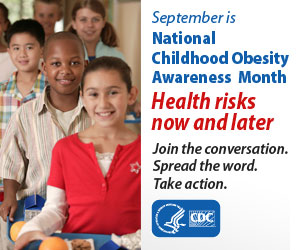
September is National Childhood Obesity Awareness Month
One in 3 children in the United States is overweight or obese. Childhood obesity puts kids at risk for health problems that were once seen only in adults, like type 2 diabetes, high blood pressure, and heart disease.
Despite recent declines in the prevalence among preschool-aged children, obesity among children is still too high. For children and adolescents aged 2-19 years, the prevalence of obesity has remained fairly stable at about 17% and affects about 12.7 million children and adolescents for the past decade.
- Approximately 17% (or 12.7 million) of children and adolescents aged 2—19 years are obese.
- The prevalence of obesity among children aged 2 to 5 years decreased significantly from 13.9% in 2003-2004 to 8.4% in 2011-2012.
What can be done?
The YMCA offers the following tips to help families incorporate regular physical activity and healthy eating:
- Eat Healthy: Make water the drink of choice (supplemented by age-appropriate portions of 100 percent fruit juices and low-fat milk) and make it easy for everyone to fill half their plates with fruits and vegetables by offering two or three colorful options. Feel free to mix and match fresh, frozen and canned fruits and vegetables to provide variety.
- Play Every Day/Go Outside: Kids should have at least an hour a day of unstructured play outside (when possible) and break a sweat at least three times a week by getting 20 minutes or more of vigorous physical activity.
- Get Together: Eat as a family as frequently as possible with kids involved in meal preparation and clean up. In addition, adults should take a break from electronics and spend one-on-one time each day with their kids, enjoying one another’s company.
- Reduce Screen Time: Time spent in front of a television, computer, tablet, cell phone or video games should be limited to two hours per day.
- Sleep Well: Kids and adults need to keep a regular sleep schedule—10-12 hours per night for kids and seven to eight hours for adults.
Talk to our doctor about your child obesity. Call or Setup an Appointment Online.
More Resources
- National Childhood Obesity Facts (From CDC)
- President Obama Proclaims September 2015 National Childhood Obesity Awareness Month


Most Commented